Since 1936, BJC has advocated on Capitol Hill and in the courts as a watchdog over separation between the institutions of church and state.
A timeline of some of our work at Baptist Joint Committee for Religious Liberty and how it has contributed to church-state law and policy:
History
BJC’s Work
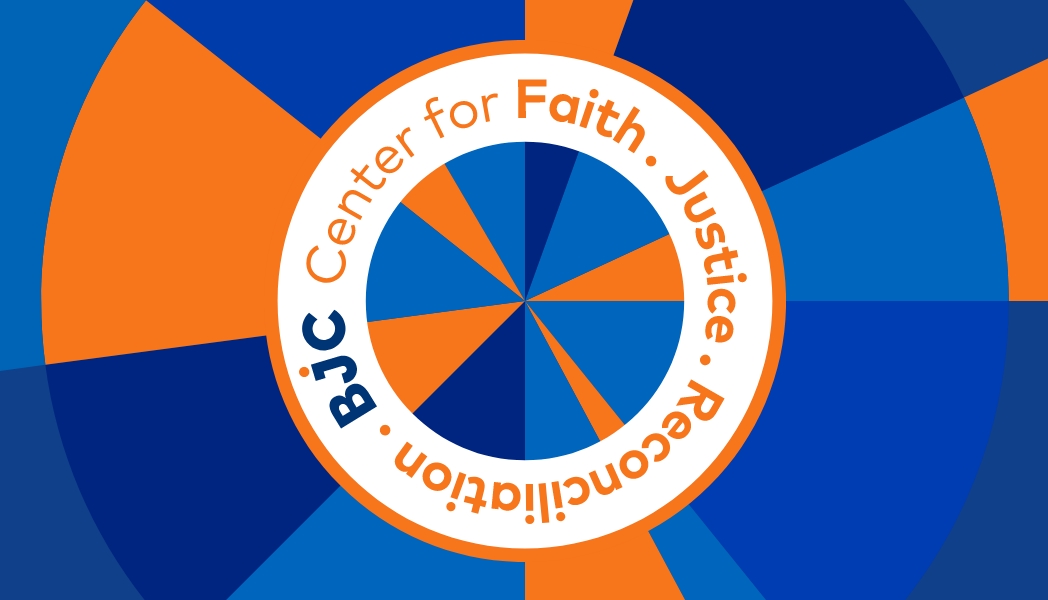
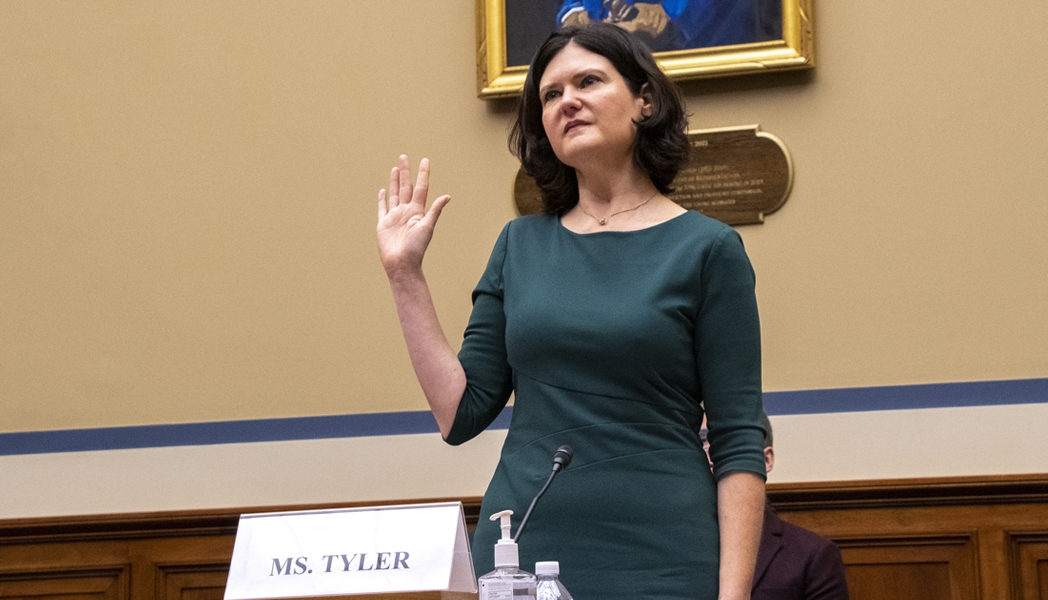
2021
January 6, 2021: A violent mob storms the U.S. Capitol in an attempt to overturn the 2020 presidential election results, waving Christian flags and holding Christian symbols. The attack becomes a wake-up call for many people, showing how dangerous Christian nationalism can be in the hands of extremists.
2020
The COVID-19 pandemic leads to the temporary closure of many public places and debates over religious exemptions to public health laws.
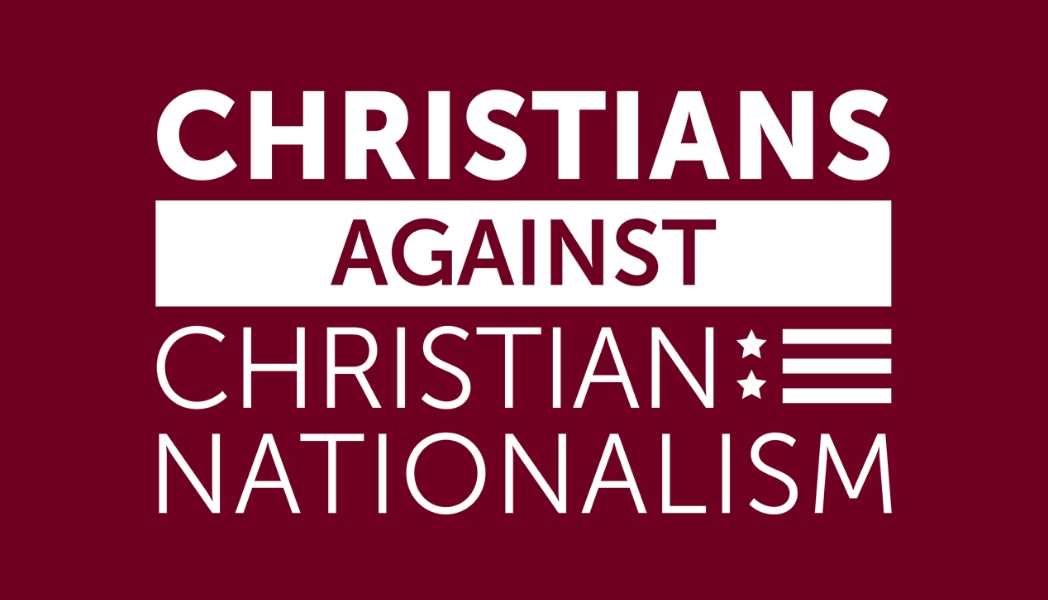
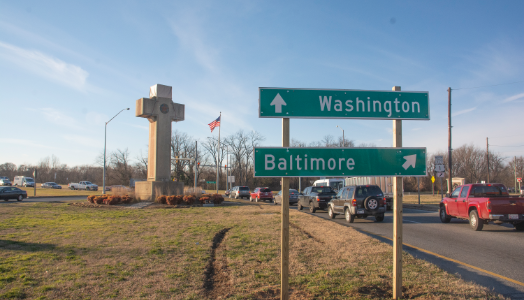
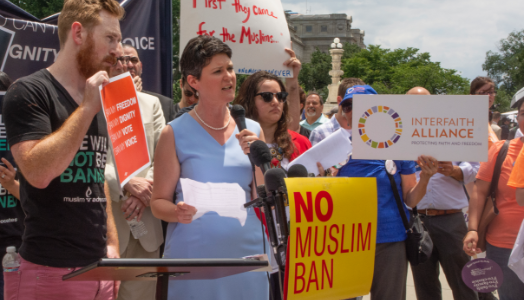
2017
Within weeks of taking office, President Trump calls for a repeal of the Johnson Amendment and institutes a ban on travelers entering the U.S from seven majority-Muslim countries.
2015
The Supreme Court rules that same-sex couples have the right to marry in Obergefell v. Hodges.
2014
In Burwell v. Hobby Lobby Stores, Inc., the Supreme Court rules that a closely held, for-profit corporation can be eligible for the same religious accommodations as faith-based organizations.
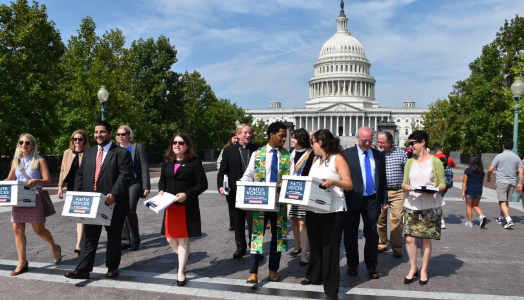
2009
The 400th anniversary of the Baptist movement.
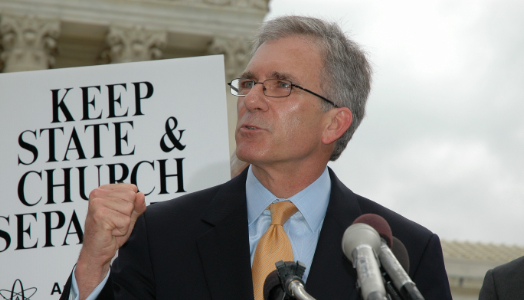
2001
Alabama’s Chief Justice Roy Moore installs a two-ton Ten Commandments monument in the state Judicial Building.
1997
In City of Boerne v. Flores, the Supreme Court holds RFRA unconstitutional in states; the law now only applies to the actions of the federal government.
1993
President Bill Clinton signs the Religious Freedom Restoration Act (RFRA) into law.
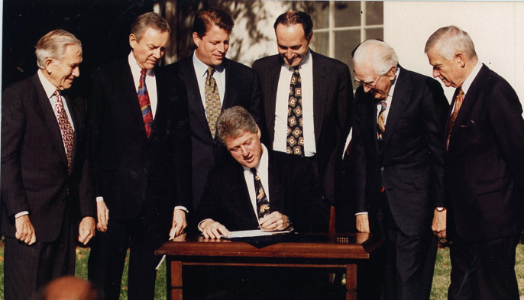
1990
In Employment Division v. Smith, the Supreme Court denies the free exercise claim of two Native Americans who ingested sacramental peyote. The ruling departs from the long-standing principle that the government must show “a compelling state interest” before interfering with religious practices.
1980
Ronald Reagan is elected president with
broad support from evangelicals.
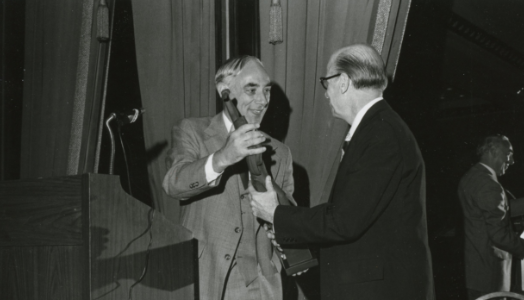
1964
The Civil Rights Act of 1964 passes, outlawing discrimination based on race, color, religion, sex, or national origin.
1956
President Dwight D. Eisenhower signs bill declaring “In God We Trust” as the official motto of the United States.
1948
United Nations adopts the Universal Declaration of Human Rights. Article 18 states “Everyone has the right to freedom of thought, conscience and religion; this right includes freedom to change his religion or belief, and freedom, either alone or in community with others and in public or private, to manifest his religion or belief in teaching, practice, worship and observance.”
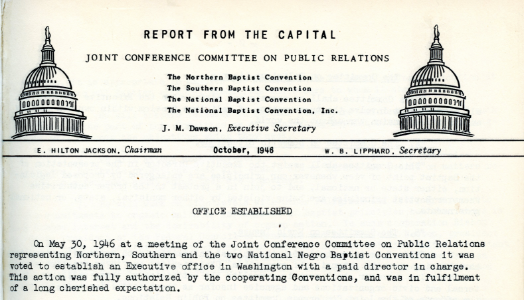
2023
The BJC Center for Faith, Justice and Reconciliation begins offering a variety of educational programs that expand and deepen our understanding of religious freedom with a broader justice lens.
2022
In Kennedy v. Bremerton, BJC files a brief noting that public schools serve diverse populations, and school officials are properly prohibited from encouraging or discouraging religious activity when acting in their official government capacities. The Supreme Court’s decision sowed more confusion, ruling for the public school official and abandoning long-standing Establishment Clause protections in ways that harm the religious freedom rights of students.
Amanda Tyler testifies before Congress during a hearing about confronting white supremacy, providing the first-ever congressional testimony focusing on the threats of Christian nationalism to the nation.
In conjunction with the Freedom From Religion Foundation, BJC releases the most comprehensive report on the role of Christian nationalism in the January 6, 2021, attack on the U.S. Capitol.
2020
BJC launches the Respecting Religion podcast, bringing weekly conversations to a nationwide audience on religion and the law, including real time legal developments on vaccine mandates and stay-at-home orders during the COVID-19 pandemic.
2019
BJC launches Christians Against Christian Nationalism, a movement of Christians working to counter Christian nationalism and end the threat it poses to the faith and to our democracy.
BJC appoints a Special Committee on Race and Religious Liberty to study BJC’s past. While we have been a group of white and Black Baptist denominations committed to protecting faith freedom for all, how welcome were Black Baptists at the BJC Board table, which was predominantly white? Knowing that religious freedom is not possible without physical freedom, that committee launched BJC’s Project on Race and Religious Freedom, reimagining our mission at the intersection of race and religious freedom.
BJC says the display of a 40-foot cross on government property is unconstitutional because the cross is not secular — it’s the preeminent symbol of Christianity. Supreme Court justices asked several questions from BJC’s brief during oral arguments, as they grappled with whether the cross has been secularized in order to justify keeping it on government land. The Court ruled that this free-standing cross can remain in place, relying on the memorial’s history. BJC’s brief is quoted in the dissent.
2018
Opposing the third iteration of a travel ban, BJC stands with minority religious groups in Trump v. Hawaii, arguing in a brief that the government cannot enact laws designed to harm a religious group. The Supreme Court disagrees, upholding the validity of the ban as within the president’s powers.
In Masterpiece Cakeshop v. Colorado Civil Rights Commission, BJC argues that a business owner’s religious beliefs do not provide a blanket exemption to state laws that protect against discrimination in the commercial marketplace. The Supreme Court sidesteps the central question, ruling against the way the law was enforced.
2017
BJC leads efforts to organize religious groups and faith leaders in asking Congress to keep the Johnson Amendment, a law that protects houses of worship from the pressures of partisan campaigning, including turning their coffers into political slush funds.
2016
In Zubik v. Burwell, religious nonprofits, objecting to the Affordable Care Act’s contraceptive mandate, claim that even agreeing to the opt-out option violates their rights. BJC says the opt-out is a good solution; all-or-nothing thinking is dangerous to religious liberty. The Supreme Court declines to rule on the merits of the case.
2015
BJC and 14 other religious groups join to defend the right of a Muslim woman to wear her hijab at work in Equal Employment Opportunity Commission v. Abercrombie & Fitch Stores, Inc. The Supreme Court agrees.
2012
BJC files a brief in Hosanna-Tabor Evangelical Lutheran Church and School v. Equal Employment Opportunity Commission, defending church autonomy and the “ministerial exception,” and in support of a church-run school’s right to fire a teacher it designated as a called minister. In a unanimous decision, the Supreme Court agrees.
2005
The controversy over monuments of the Ten Commandments on state property reaches the Supreme Court, with cases out of Texas and Kentucky. BJC files briefs in both, opposing the government sponsorship of religion. The Court issues split decisions—upholding the Texas display and striking down the one in Kentucky—relying on the distinct facts of each case.
2000
BJC leads a diverse coalition of religious and civil liberty groups in pushing for passage of the Religious Land Use and Institutionalized Persons Act (RLUIPA). This law restores strong protections for free exercise of religion in two legal areas with persistent problems: zoning laws that apply to religious organizations and individuals in government custody.
1993
In response to Employment Division v. Smith, BJC leads more than 60 groups, including the ACLU and the National Association of Evangelicals, to help pass the Religious Freedom Restoration Act (RFRA), restoring protections from unnecessary government infringement on religious practice.
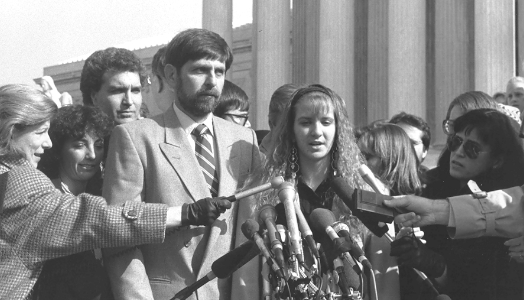
1992
BJC files a brief in Lee v. Weisman on behalf of the family who successfully challenged official prayers at a public high school graduation, arguing that government must remain neutral in matters of religion.
1984
BJC supports the Equal Access Act, allowing public school students who wish to meet for religious purposes the same rights granted to other voluntary, student-initiated groups.
1979
American Jewish Committee presents BJC with the Isaiah Award in appreciation of its efforts to work for justice for all people.
1970
Progressive National Baptist Convention — the denominational home of the late Dr. Martin Luther King Jr. — joins BJC.
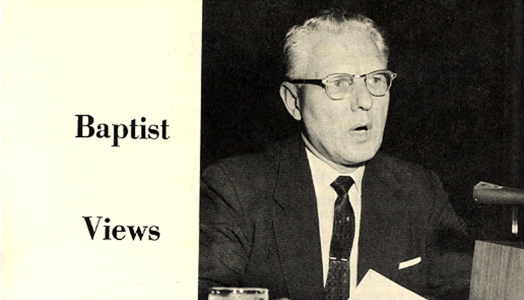
1957
BJC successfully opposes congressional proposals to officially declare the United States a “Christian Nation” and to make Good Friday a legal holiday.
1947
BJC files its first amicus brief in Everson v. Board of Education, and Chairman E. Hilton Jackson argues the case before the U.S. Supreme Court, opposing the use of tax dollars for transportation to parochial schools. While the Court rules to uphold the law, Justice Hugo Black writes one of the most famous passages in favor of the separation of church and state.
1946
BJC, now called The Joint Conference Committee on Public Relations, opens a permanent office in Washington D.C.
1936
BJC starts out as the Committee on Public Relations of the Southern Baptist Convention, founded to handle church-state matters. It soon becomes the first national organization to unite Baptists across denominational lines in a joint endeavor.
BJC’s Work Timeline
2023
The BJC Center for Faith, Justice and Reconciliation begins offering a variety of educational programs that expand and deepen our understanding of religious freedom with a broader justice lens.

2022
In Kennedy v. Bremerton, BJC files a brief noting that public schools serve diverse populations, and school officials are properly prohibited from encouraging or discouraging religious activity when acting in their official government capacities. The Supreme Court’s decision sowed more confusion, ruling for the public school official and abandoning long-standing Establishment Clause protections in ways that harm the religious freedom rights of students.
Amanda Tyler testifies before Congress during a hearing about confronting white supremacy, providing the first-ever congressional testimony focusing on the threats of Christian nationalism to the nation.

In conjunction with the Freedom From Religion Foundation, BJC releases the most comprehensive report on the role of Christian nationalism in the January 6, 2021, attack on the U.S. Capitol.
2021 in History
January 6, 2021: A violent mob storms the U.S. Capitol in an attempt to overturn the 2020 presidential election results, waving Christian flags and holding Christian symbols. The attack becomes a wake-up call for many people, showing how dangerous Christian nationalism can be in the hands of extremists.
2020
BJC launches the Respecting Religion podcast, bringing weekly conversations to a nationwide audience on religion and the law, including real time legal developments on vaccine mandates and stay-at-home orders during the COVID-19 pandemic.
2020 in History
The COVID-19 pandemic leads to the temporary closure of many public places and debates over religious exemptions to public health laws.
2019
BJC launches Christians Against Christian Nationalism, a movement of Christians working to counter Christian nationalism and end the threat it poses to the faith and to our democracy.

BJC appoints a Special Committee on Race and Religious Liberty to study BJC’s past. While we have been a group of white and Black Baptist denominations committed to protecting faith freedom for all, how welcome were Black Baptists at the BJC Board table, which was predominantly white? Knowing that religious freedom is not possible without physical freedom, that committee launched BJC’s Project on Race and Religious Freedom, reimagining our mission at the intersection of race and religious freedom.
BJC says the display of a 40-foot cross on government property is unconstitutional because the cross is not secular — it’s the preeminent symbol of Christianity. Supreme Court justices asked several questions from BJC’s brief during oral arguments, as they grappled with whether the cross has been secularized in order to justify keeping it on government land. The Court ruled that this free-standing cross can remain in place, relying on the memorial’s history. BJC’s brief is quoted in the dissent.

2018
In Masterpiece Cakeshop v. Colorado Civil Rights Commission, BJC argues that a business owner’s religious beliefs do not provide a blanket exemption to state laws that protect against discrimination in the commercial marketplace. The Supreme Court sidesteps the central question, ruling against the way the law was enforced.
Opposing the third iteration of a travel ban, BJC stands with minority religious groups in Trump v. Hawaii, arguing in a brief that the government cannot enact laws designed to harm a religious group. The Supreme Court disagrees, upholding the validity of the ban as within the president’s powers.

2017
BJC leads efforts to organize religious groups and faith leaders in asking Congress to keep the Johnson Amendment, a law that protects houses of worship from the pressures of partisan campaigning, including turning their coffers into political slush funds.
2017 in History
Within weeks of taking office, President Trump calls for a repeal of the Johnson Amendment and institutes a ban on travelers entering the U.S from seven majority-Muslim countries.
2016
In Zubik v. Burwell, religious nonprofits, objecting to the Affordable Care Act’s contraceptive mandate, claim that even agreeing to the opt-out option violates their rights. BJC says the opt-out is a good solution; all-or-nothing thinking is dangerous to religious liberty. The Supreme Court declines to rule on the merits of the case.
2015
BJC and 14 other religious groups join to defend the right of a Muslim woman to wear her hijab at work in Equal Employment Opportunity Commission v. Abercrombie & Fitch Stores, Inc., The Supreme Court agrees.
2015 in History
The Supreme Court rules that same-sex couples have the right to marry in Obergefell v. Hodges.
2014 in History
In Burwell v. Hobby Lobby Stores, Inc., the Supreme Court rules that a closely held, for-profit corporation can be eligible for the same religious accommodations as faith-based organizations.
2012
BJC files a brief in Hosanna-Tabor Evangelical Lutheran Church and School v. Equal Employment Opportunity Commission, defending church autonomy and the “ministerial exception,” and in support of a church-run school’s right to fire a teacher it designated as a called minister. In a unanimous decision, the Supreme Court agrees.

2010
BJC participates in the drafting of Religious Expression in American Public Life: A Joint Statement of Current Law, a consensus document from groups on the “right” and “left” to help find common ground.
2009 in History
The 400th anniversary of the Baptist movement.
2005
The controversy over monuments of the Ten Commandments on state property reaches the Supreme Court, with cases out of Texas and Kentucky. BJC files briefs in both, opposing the government sponsorship of religion. The Court issues split decisions—upholding the Texas display and striking down the one in Kentucky—relying on the distinct facts of each case.

2001
Alabama’s Chief Justice Roy Moore installs a two-ton Ten Commandments monument in the state Judicial Building.
2000
BJC leads a diverse coalition of religious and civil liberty groups in pushing for passage of the Religious Land Use and Institutionalized Persons Act (RLUIPA). This law restores strong protections for free exercise of religion in two legal areas with persistent problems: zoning laws that apply to religious organizations and individuals in government custody.
1997 in History
In City of Boerne v. Flores, the Supreme Court holds RFRA unconstitutional in states; the law now only applies to the actions of the federal government.
1993
In response to Employment Division v. Smith, BJC leads more than 60 groups, including the ACLU and the National Association of Evangelicals, to help pass the Religious Freedom Restoration Act (RFRA), restoring protections from unnecessary government infringement on religious practice.

1993 in History
President Bill Clinton signs the Religious Freedom Restoration Act (RFRA) into law.

1992
BJC files a brief in Lee v. Weisman on behalf of the family who successfully challenged official prayers at a public high school graduation, arguing that government must remain neutral in matters of religion.
1990
In Employment Division v. Smith, the Supreme Court denies the free exercise claim of two Native Americans who ingested sacramental peyote. The ruling departs from the long-standing principle that the government must show “a compelling state interest” before interfering with religious practices.
1984
BJC supports the Equal Access Act, allowing public school students who wish to meet for religious purposes the same rights granted to other voluntary, student-initiated groups.
1980
Ronald Reagan is elected president with
broad support from evangelicals.
1979
American Jewish Committee presents BJC with the Isaiah Award in appreciation of its efforts to work for justice for all people.

1970
Progressive National Baptist Convention — the denominational home of the late Dr. Martin Luther King Jr. — joins BJC.

1964
The Civil Rights Act of 1964 passes, outlawing discrimination based on race, color, religion, sex, or national origin.
1957
BJC successfully opposes congressional proposals to officially declare the United States a “Christian Nation” and to make Good Friday a legal holiday.
1956
President Dwight D. Eisenhower signs bill declaring “In God We Trust” as the official motto of the United States.
1948
United Nations adopts the Universal Declaration of Human Rights. Article 18 states “Everyone has the right to freedom of thought, conscience and religion; this right includes freedom to change his religion or belief, and freedom, either alone or in community with others and in public or private, to manifest his religion or belief in teaching, practice, worship and observance.”
1947
BJC files its first amicus brief in Everson v. Board of Education, and Chairman E. Hilton Jackson argues the case before the U.S. Supreme Court, opposing the use of tax dollars for transportation to parochial schools. While the Court rules to uphold the law, Justice Hugo Black writes one of the most famous passages in favor of the separation of church and state.
1946
BJC, now called The Joint Conference Committee on Public Relations, opens a permanent office in Washington D.C.

1936
BJC starts out as the Committee on Public Relations of the Southern Baptist Convention, founded to handle church-state matters. It soon becomes the first national organization to unite Baptists across denominational lines in a joint endeavor.
Be part of our future!
Your financial support makes our work possible. Help us to stay on top of threats to religious liberty and issues of church-state separation in our nation’s capital and across the country.




